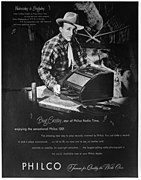Philco Radio Time
 |
|
| Other names |
The Bing Crosby Show The Bing Crosby Program |
|---|---|
| Genre | Musical variety |
| Running time | 30 minutes |
| Country | United States |
| Language(s) | English |
| Syndicates |
ABC Armed Forces Radio Network |
| Starring |
Bing Crosby Peggy Lee The John Scott Trotter Orchestra |
| Announcer |
Ken Carpenter Bob Murphy Glenn Riggs Kenny Delmar |
| Written by |
Charles Tazewell Bill Morrow Larry Clemmons Al Lewis |
| Directed by | Murdo MacKenzie |
| Produced by | Bill Morrow |
| Recording studio | Hollywood, USA |
| Air dates | October 16, 1946 to June 1, 1949 |
| No. of series | 3 |
| No. of episodes | 108 |
| Opening theme | Where the Blue of the Night (Meets the Gold of the Day) |
| Sponsored by |
Philco see below |
Philco Radio Time was an old-time radio radio series starring entertainer Bing Crosby. The series ran over ABC Radio with episodes airing from October 16, 1946–June 1, 1949. The series also was syndicated for a period of time over the Armed Forces Radio Network.
The series is also known for being the first pre-recorded radio program aired on the major USA radio networks. For the first season, the shows were recorded on disc, but beginning with the series' second season, the show began using Ampex tape recorders for their broadcasts.
The program was usually recorded in Hollywood and was sponsored by the Philco Corporation.
Starting in 1931, singer and entertainer Bing Crosby had had many appearances on radio as a solo performer before Philco Radio Time. In January 1936, Crosby moved from CBS Radio to NBC working as the master of ceremonies for the Kraft Music Hall. In June 1945, with the ensuing accompaniment of much legal wrangling, Bing Crosby terminated his almost, ten-year association with the Kraft Foods Company, leaving himself free to choose another sponsor. He declined other offers in favour of a deal with the Philco Corporation of America which, apart from the financial considerations involved, afforded the appealing convenience of pre-recording his broadcasts. He was obliged to honour an agreement with Kraft which required him to appear in thirteen more shows, the last of which was broadcast in May 1946 but then, on Wednesday October 16th 1946, ‘'Philco Radio Time' - The Bing Crosby Show’, opened on the ABC network and (according to the publicity of the time), Wednesday, became ‘Bing’s Day’.
Unfortunately, after a promising start, Philco began to lose its audience. This occurred during a three-year period when Bing, in spite of the criticisms levelled at the time, was still, consistently, the cinema’s biggest box-office draw and was still racking up outstanding record sales, including five more million-sellers. Many theories have been propounded for the slump in ratings - loss of voice, loss of spontaneity, loss of sound quality, etc., but in fact, the whole of the radio industry was declining world-wide as a form of entertainment. The public, perhaps, were in pursuit of a more sophisticated distraction than the medium which had served them so well and often been their sole comfort during the war years. Live entertainment was back. Theatres closed for the duration had re-opened their doors; international sporting events could be seen again. The cinema was, naturally, still booming and most significant of all, television had returned, flexing its muscles in preparation for an overwhelming victory as the most popular in-home entertainment.
...
Wikipedia
